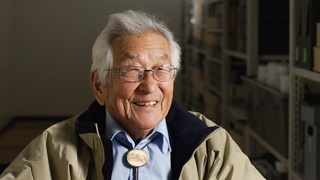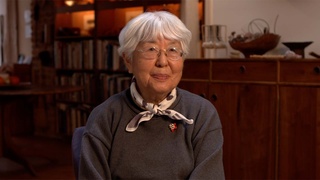Interviews
A Dutiful Son
My mother used to write me once a week in about a half-page typewriter-size paper, just a summary of events. She said when she arrived was -- and was unpacking at Tule Lake, a knock came. And she opened the door, and there were two ladies, dusty, shoes dusty and so on. They had walked from the other end of camp, they were one of the first inmates there. ... They said, "We heard that the family of the boy that's in jail is arriving today. So we came out to welcome you and to say thank you for your son."
And when I read that, I experienced a sudden removement of weight on my shoulders, which I didn't realize I was carrying, ever since the time when my mother pled with me to, she said, "I admire what you've done. I agree with you. But if we get separated now, we may never see each other again. If the government could do this sort of thing, it could keep us apart. So please, come with us. It's important to keep together." And I said, "I'd like to, but I'm in, I'm in the hands of others who are looking after me, and you don't have to worry on that part. I just can't go. I wouldn't be the same person if I went now because I, I took a stand, and I can't give it up."
And so even tears couldn't change my views. But it gave me a sense of guilt on failing to respond as a dutiful son. But I didn't realize I was carrying it. When I read that letter saying, that visit gave me a big lift, that weight left.
Date: December 5, 1999
Location: Washington, US
Interviewer: Tom Ikeda, Alice Ito
Contributed by: Denshō: The Japanese American Legacy Project.
Explore More Videos

Invited to teach at Harvard by his boss
(1919 - 2015) Nisei who served in World War II with the 442nd Regimental Combat Team

The riot in Manzanar
(b. 1921) Nisei veteran who served in the occupation of Japan

The Dopey bank that survived the war
(b. 1934) Award-winning Disney animation artist who was incarcerated at Topaz during WWII

Evacuated to the Jungle
(b. 1938) Philipines-born hikiagesha who later migrated to the United States.

Captured by Guerillas after bombing of Pearl Harbor
(b. 1938) Philipines-born hikiagesha who later migrated to the United States.

Grandfather picked up by US Army
(b. 1952) Former banking executive, born in Hawaii

Father's business partner operated their farming business during WWII
(b. 1935) Sansei businessman.

Father was convinced the constitution would protect him
(b. 1935) Sansei businessman.

The lack of discussion about family’s incarceration in Amache
Sansei judge for the Superior Court of Los Angeles County in California


Her brother’s reasons as a No-No Boy
(b. 1923) Japanese American poet, activist

Her grandfather was pressured to teach Japanese
Sansei judge on the Superior Court of Los Angeles County in California

Neighbor took care of her mother after grandfather was taken by FBI
Sansei judge on the Superior Court of Los Angeles County in California

Immediately after the bombing
(b. 1938) Japanese American. Hiroshima atomic bomb survivor

Other family members not as lucky
(b. 1938) Japanese American. Hiroshima atomic bomb survivor
